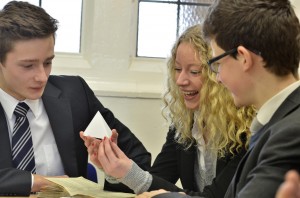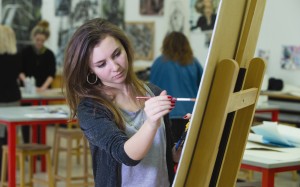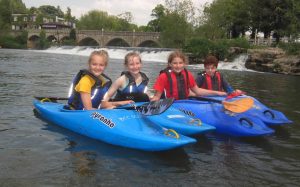When you have selected the right school for your child, it’s time to start the application process
The application process covers a number of steps, ideally taken over a period of two or more years, although the timescale can vary greatly and can be considerably shorter. In simple terms, it is never too early to start. There is competition for places, and the more popular schools tend to become fully booked at least a year in advance. However, schools have become increasingly flexible when considering applications for boarding places, so it is always worth enquiring. In many countries, the academic year runs from January to December, rather than September to July as in the UK. If this is the case in your country, your child is likely to be one term behind pupils in the UK of the same age. For example, GCSE exams are taken in May-July in the UK, while International GCSE (IGCSE) exams are normally taken in November and December. In this instance, it would be advisable for pupils to enter the UK system in the September following the IGCSEs, rather than try to catch up the lost ground over the year of the GCSE exams.
Making an application
All schools require parents to complete an application or registration form. This is an official request to be admitted as a pupil, normally for the start of the UK school year in September. Normally you will be required to agree to advance payment of all fees, possibly including extras for the next term. There will also be reference to entry requirements and registration fees, which are not normally refundable. In some cases, you may also be asked to pay acceptance fees, which are normally retained against the final term’s accounts and extras, and sign a parent–school contract.
Preparation for entrance exams
The standard exam entrance points for most academically selective boarding independent schools are 4+, 7+, 8+, 11+, 13+ and 16+. The time between registration for a school and the sitting of exams obviously varies from school to school, as do the circumstances of each applicant. Some children sit entry exams or tests from well-established feeder schools, which are well versed in providing the necessary teaching and preparation. Other schools know little about the entry requirements for independent schools, though any school overseas following the National Curriculum of England, Wales and Northern Ireland shouldn’t find it too difficult to offer some kind of support. In these cases, some kind of individual preparation and coaching can be helpful.
Entrance exams and interviews
All pupils will have to satisfy the school’s entry requirements, which will include taking a test or exam and possibly attending an individual interview. If it is not possible for the overseas applicant to be in the UK at the normal time of an exam, special arrangements can usually be made either by examining the pupil during a visit to the school or by sending papers to an approved examination centre in the pupil’s home country. These entrance exams can be taken in some British Council offices and overseas schools that satisfy the criteria for administering and supervising external examinations.
Pre-prep school
At the pre-prep stage (generally ages 5-6+, Years 1 and 2), boarding is not usually an option, although a very small number of pre-prep schools offer boarding from age 5. To enrol a child in a pre-prep school, you may need to get his or her name on a waiting list years before the proposed starting date.
Preparatory school
At prep school level (ages 7–10+, Years 3–6), pupils will probably have to take the school’s formal assessments in mathematics, English, and possibly reading and verbal reasoning. The main ages for transferring from junior to senior school and also from the maintained to the independent sector are 11+ and 13+. In Scotland, independent schools are generally more flexible about points of entry, but most pupils join senior schools at age 12+ (S1 in the Scottish year numbering scheme) or age 13+ (S2).
11+ Examinations: Year 6
Almost all independent schools, for students aged 11-18, hold 11+ entrance examinations in Year 6. The 11+ process for independent schools begins in Year 4/5, when, as parents, you will identify the schools you wish your child to apply to and registration to be assessed for a place. 11+ examinations are held in Year 6, normally in late autumn or early January. Formats vary, but all schools test mathematics and English and usually verbal reasoning. Most independent
schools offer 11+ interviews to some or all candidates – and often parents, too.
Senior school
Pre-Tests: Year 6 or 7. These are routinely used for assessing those who intend to sit Common Entrance Examinations in Year 8 for entry to independent schools at age 13. The tests are in verbal reasoning, non-verbal reasoning, English and mathematics and provide a standardised assessment measure; the tests are usually online, multiple-choice and often adaptive. Exams are approximately three hours.
13+ Assessments: Year 8. The Common Entrance 13+ exams, required for entry to independent schools at 13-plus, are in June of Year 8. The subjects covered at age 13+ include English, mathematics, a modern and/or classical language, science, history, geography and religious education. Core subjects are English, mathematics and science. Individual schools will specify the other subjects which need to be taken. Interviews may take place at Common Entrance pre-test stage in Year 6 or at the time of the 13+ exam. Schools may also offer places to pupils aged 14+ and 15+ on a similar basis.
The Common Entrance is an official examination administered by the independent sector, with the aim of providing continuity and consistency within the sector. The papers are set by the Independent Schools Examinations Board (ISEB) and can be taken between the ages of 11+ and 13+ by those who wish to move from an independent preparatory school or junior school to a senior school. The exam is usually taken at the child’s current school, and the answers marked by the first-choice senior school, with unsuccessful applicants’ papers being referred to the second-choice school. Some schools set their own examinations, the timings of these examinations and tests can vary, but most take place in February/March and May for September entry.
Parents should be warned there is a debate currently running about the appropriateness of Common Entrance. Consequently, a small number of prep schools are developing a Prep School Baccalaureate that focuses on a far broader range of assessment areas (including teamwork, leadership and extracurricular activities), which is marked internally by the prep school on a rolling basis rather than a single set of final exams.
GCSEs: Years 10-11. Entry at Year 9 depends mainly on reports from the current school. In Year 9, students have GCSE choices for a two-year programme running throughout Years 10-11.
Sixth form
The success of a student aged 16+ applying for a place at a school’s sixth-form (Years 12 and 13) or a sixth-form college is normally dependent on their achieving either five or six GCSEs at grade 5/6 or above (or a similar number of Scottish Standard Grades at grade 3 or above). Some schools set their own tests in the subjects the applicant wishes to study in the sixth form, and hold interviews in either the autumn or spring term before the year of entry. In the Scottish state system, pupils in S5 and S6 (ages 16+ and 17+) take Highers and Advanced Highers, some independent schools in Scotland offer these exams.
Scholarship candidates
Many schools offer scholarships and awards for pupils aged 11+, 13+ and 16+. As well as academic scholarships, there are financial awards for music, drama, art and sport. Scholarship candidates normally sit more advanced papers than the normal entrance exams, mainly in March/May. Schools will be able to provide further details about their scholarships and bursaries.
Final preparation
Once entrance requirements have been met and the offer of a place confirmed, plans for the immediate future can be finalised. After the initial period of celebration and relief, it is possible that doubts of some kind may arise. These may well be a sign of nerves, which can be settled by reassurance, probably from someone who has been through the experience themselves. There may be a need to obtain extra English tuition. Sometimes, however, worry can be felt about the extent of the financial commitment, whether or not the school meets the child’s needs, and how the child will adapt to studying and living in the UK. Again, such doubts need to be acknowledged early and overcome with the help of someone who can provide realistic solutions. In all such cases, going to someone with the experience to help is essential. It is important that parents’ anxieties should not be conveyed to the child as he or she focuses on the excitement and opportunities ahead. Arriving in the UK early will allow an opportunity to visit the school, maybe for an open day, before your child starts. It will give you the chance to meet the prospective housemaster or housemistress, to obtain the school uniform and to see something of the school. If this can be done during a previous term, it will be possible to see something of the school in action, and to meet teachers and future friends, which should help to lessen any fears. It is important that you establish some form of contact at the school, whom you can telephone for advice or help, to provide reassurance.
School entry
The actual start of an international pupil’s boarding life in the UK is something that parents need to consider and prepare for carefully. If they are unable to accompany their child to the school, they should do all they can to persuade their child’s guardian in the UK to do this to provide as much support and reassurance as possible. The guardian should also introduce themselves personally to the school and to the key members of staff.
Schools prepare carefully for the pupils’ first day, in their own ways. They arrange meetings with key members of staff, briefings for new parents and introductions within the school to new pupils. It will all be done with brisk efficiency, and before long the children are whisked off to become a part of their new environment, while their parents or guardians undertake the journey home to a much quieter house. Many offer induction courses involving introduction to boarding school life and English culture.
The first official exeat (leave) weekend may be some time ahead, but whenever it is, use it to re-establish your child’s link with the guardian family. The pupil’s relationship with their UK guardian, by whatever method of communication that is agreed, provides essential support for the school and encouragement to the boarder.
Your application checklist
- Carry out research into possible schools
- If possible, visit schools at least a year before your child’s entry date
- Complete application form and register with school
- Pay deposit/application fee during the year before entry
- Your child should prepare for and sit entrance exams at an agreed location. If possible obtain past copies of exams.
- If possible, visit the school for interview during spring and summer term before entry
- Prepare for entry and complete all essential paperwork
- Purchase school uniform and items on clothing list, during the summer term or holidays before entry
Glossary
Common Entrance: An exam taken in the final term at preparatory schools to select pupils for entry to many independent senior schools.
Independent Schools Examinations Board (ISEB): The examinations board that administers the Common Entrance exam.



